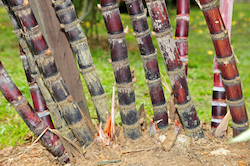A severe drought has hit São Paulo, Brazil and has severely affected the production of sugarcane in the state. Estimates of the Brazilian Sugarcane Industry Association (UNICA) show the lose around 15 percent or almost 40 million tons of sugarcane. Another factor in crop loss has been accidental fires due to the dry conditions. This comes at a time when the country is looking to increase its national ethanol mandate to 27 percent ethanol fuel blend.
The low rainfall seen throughout this year has increased outbreaks of fires not only in the areas of cultivation of sugarcane but also in areas planted with other crops, pastures and vegetation cover.  Information collected by the Environmental Police and other state government agencies show that by the beginning of September had already been recorded 2,981 fire outbreaks and forest fires in São Paulo – that number is 140 percent higher than the same period of 2013.
Information collected by the Environmental Police and other state government agencies show that by the beginning of September had already been recorded 2,981 fire outbreaks and forest fires in São Paulo – that number is 140 percent higher than the same period of 2013.
Fires are often erroneously attributed to sugarcane producers due to the process of burning straw. However, UNICA points out that since 2007 the sector has been given the Green Protocol, established voluntarily by the state government of São Paulo to end burning.
“The productive sector has made a huge effort to accelerate the end of the use of fire and significantly exceeded expected to reduce the use of controlled burning in detrash of cane sugar schedule,” said Elizabeth Farina, UNICA president.
The drought has caused people to raise concern over raising the country’s ethanol mandate but no decision has yet been made to increase, decrease or keep the mandate in tact as is.

